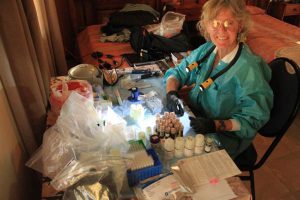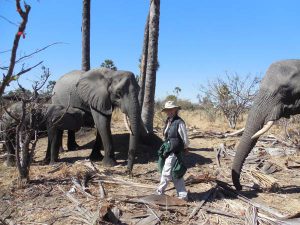Here at Promega we receive some interesting requests…
Take the case of Virginia Riddle Pearson, elephant scientist. Three years ago we received an email from Pearson requesting a donation of GoTaq G2 Taq polymerase to take with her to Africa for her field work on elephant herpesvirus. Working out of her portable field lab (a tent) in South Africa and Botswana, she needed a polymerase she could count on to perform reliably after being transported for several days (on her lap) at room temperature. Through the joint effort of her regional sales representative in New Jersey/Pennsylvania (Pearson’s lab was based out of Princeton University at the time) and our Genomics product marketing team, she received the G2 Taq she needed to take to Africa. There she was able to conduct her experiments, leading to productive results and the opportunity to continue pursuing her work.

In a follow up thank you note she sent, she wrote:
“The sequence results using Promega’s GoTaq G2 are providing superior data, so critical for the future survival of elephants in the wild.”
Now working as a visiting scientist at the Fox Chase Cancer Center in Philadelphia, Pearson has taken some major steps forward in identifying a variety of strains of herpesvirus native to the elephant population. Tackling this project essentially on her own, she is grateful for the support she’s received that has allowed her to travel to Africa on four different occasions in the past seven years.
Pearson’s interest in elephants was fueled nearly half a century ago when she became involved in elephant conservation through Save the Elephants. A research opportunity arose and she jumped at the chance to tackle it. “When we needed to find out which elephant herpesviruses are endogenous to African elephants I decided to go myself to Africa to try and answer these questions,” she says. “That meant organizing and funding research expeditions on my own.” Her preliminary work did prove to identify which viruses are endogenous to wild and captive African elephants, a question that had to first be answered if vaccines against these pathogenic and deadly viruses are to be created.

The strategy developed by Pearson involved collecting not only biopsies from herpesvirus skin lesions on wild African elephants, but saliva swabbings as well. She then analyzed the different species and subspecies through extensive genetic sequencing (she had to”learn molecular biology in order to do this”) and compared those results to saliva samples she had collected in captive African and Asian herds across America. Her protocol for collecting saliva swabs from captive, semi-wild and immobilized wild elephants has proven to be a very valuable diagnostic tool for others in the field.
She is currently comparing sequence results from saliva samples to blood samples to test their efficiency as a pre-diagnostic tool for pathogenic herpesvirus treatment. This can help to determine which infections may require drug therapy and clinical intervention—a necessary step if an infected elephant has any hope of survival. “Because not all elephant herpesvirus are equally pathogenic, it is very critical to identify which species/subspecies are infecting a particular elephant,” she explains. And that is where the GoTaq G2 Hot Start Green Master Mix, her current product of choice, comes into play. Says Pearson, “It is my workhorse!”
African elephant population studies in the news
Elephant related science is making headlines in various ways as of late; other lines of research aimed at ultimately saving the dwindling elephant population has been in the news. Yet in these cases attention is focused on the ivory trade, not viruses, and how it is impacting the global elephant population. The 17th meeting of the Convention on the International Trade in Endangered Species (CITES) wraps up today in Johannesburg, South Africa. There, scientists working to protect endangered elephants provided evidence on why legalizing ivory trade, a controversial idea proposed by elephant-rich African nations, will not protect elephants from dying off.
The past 25 years has seen the worst decline in the African elephant population according to the International Union for Conservation of Nature’s African Elephant Status Report. The report attributes this drop to ivory poaching which has surged in the past decade. While the argument that enacting a limited legal trade in tusks taken from carefully managed elephant populations will undermine the poaching that is depleting herds, a new study finds otherwise. Lead author of the paper, biologist David Lusseau at the University of Aberdeen in the United Kingdom, provides evidence that African elephants grow and reproduce too slowly to support a robust global trade in ivory. The demand for this ivory is simply too great, outstripping what the existing elephant population can realistically produce, and the researchers predict it will likely “kick them into extinction.”
Many wildlife concerns addressed through genomics
Elephants and other endangered species may need to rely on the work of scientists using cutting edge sequencing techniques to put an end to “wildlife crime.” Wildlife poaching is global crisis and explained how real time genetic sequencing can detect animal species on the weapons of wildlife criminals—the blood on a machete of a poacher, the bush meat sacrificed from endangered animals sold at local markets, for example. Such genomic strategies could serve to identify “DNA barcode genes” and link them to the offending criminals. This work is benefiting from the continued development of tools that are easy to use in the field.
Forensic science may soon be at the forefront of DNA testing to identify where ivory confiscated in major seizures comes from. Identifying the source of the material allows law enforcement and anti-poaching groups to pinpoint their efforts to stop the criminals. Conservation geneticist Sam Wasser of the University of Washington has contributed to this effort by creating a DNA reference map for elephant populations across Africa. This may be just the beginning of effective ways to use molecular tools and forensic approaches to protect endangered wildlife.
This blog was updated on April 4, 2024 to address broken links.
Nicole Sandler
Latest posts by Nicole Sandler (see all)
- Writing Scientific Papers: Is There More To This Story? - February 3, 2017
- Top Science Books of 2016 - January 4, 2017
- The Role of the NanoLuc® Reporter in Investigating Ligand-Receptor Interactions - December 5, 2016
